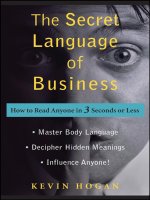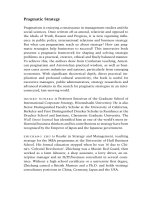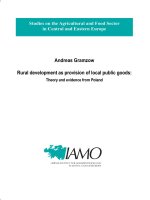Gladiators, pirates and games of trust how game theory, strategy and probability rule our lives
Bạn đang xem bản rút gọn của tài liệu. Xem và tải ngay bản đầy đủ của tài liệu tại đây (950.76 KB, 131 trang )
Haim Shapira was born in Lithuania in 1962. In 1977 he emigrated to Israel,
where he earned a PhD in mathematical genetics for his dissertation on Game
TheoryandanotherPhDforhisresearchonthemathematicalandphilosophical
approachestoinfinity.Henowteachesmathematics,psychology,philosophyand
literature. He is an author of seven bestselling books. His stated mission as a
writerisnottotrytomakehisreadersagreewithhim,butsimplytoencourage
them to enjoy thinking. One of Israel’s most popular and soughtafter speakers,
he lectures on creativity and strategic thinking, existential philosophy and
philosophy in children’s literature, happiness and optimism, nonsense and
insanity, imagination and the meaning of meaning, as well as friendship and
love. He is also an accomplished pianist and an avid collector of anything
beautiful.
FROMTHESAMEAUTHOR:
ConversationsonGameTheory
ThingsthatMatter
Infinity:TheNeverendingStory
Ecclesiastes:TheBiblicalPhilosopher
NocturnalMusings
ABookofLove
HappinessandOtherSmallThingsofAbsoluteImportance
CONTENTS
Introduction
Chapter1TheDiner’sDilemma
(HowtoLoseManyFriendsReallyFast)
Chapter2TheBlackmailer’sParadox
Chapter3TheUltimatumGame
Chapter4GamesPeoplePlay
SpotlightTheKeynesianBeautyContest
Chapter5TheMarriageBroker
(ALittleontheConnectionsbetweenthe
NashEquilibrium,Buffaloes,MatchmakingandtheNobelPrize)
IntermezzoTheGladiatorsGame
Chapter6heGodfatherandthePrisoner’sDilemma
Chapter7PenguinMathematics
IntermezzoTheRavenParadox
Chapter8Going,Going…Gone!
(ABriefIntroductiontoAuctionTheory)
IntermezzoTheNewcombParadox
Chapter9TheChickenGameandtheCubanMissileCrisis
Chapter10Lies,DamnedLiesandStatistics
Chapter11AgainstAllOdds
Chapter12OnFairlySharingaBurden
Chapter13TrustGames
Chapter14HowtoGambleIfYouMust
ConclusionGameTheoryGuidelines
ReferenceNotes
Bibliography
INTRODUCTION
This book deals with Game Theory, introducing some important ideas about
probabilitiesandstatistics.Thesethreefieldsofthoughtconstitutethescientific
foundationofthewaywemakedecisionsinlife.Althoughthesetopicsarequite
serious,I’vemadeatremendouseffortnottobeboringandtowriteabookthat’s
rigorousandamusing.Afterall,enjoyinglifeisjustasimportantaslearning.
Andso,inthisbookwewill
•MeettheNobelPrizelaureateJohnFNashandfamiliarizeourselveswith
hiscelebratedequilibrium
•Learnthebasicideasoftheartofnegotiation
•RevieweveryaspectofthePrisoner’sDilemmaandlearnaboutthe
importanceofcooperation
•Introducetheworldchampioninstrategicthinking
•ExaminetheStableMarriageProblemandfindouthowitledtoaNobel
Prize
•Visitagladiators’ringandapplyforacoachingposition
•BidinatenderatauctionandhopetoavoidtheWinner’sCurse
•Learnhowstatisticsbolsterlies
•Becomeacquaintedwiththepresenceofprobabilitiesinoperatingtheatres
•DiscoverwhatthegameofChickenhadtodowiththeCubanmissile
crisis
•Buildanairportanddivideaninheritance
•Issueultimatumsandlearntotrust
•PartakeinJohnMaynardKeynes’sbeautycompetitionandstudyits
associationwithstocktrading
•DiscusstheconceptofjusticeasseenthroughtheeyesofGameTheory
•MeetCaptainJackSparrowandfindouthowdemocraticpiratesdivide
theirtreasures
•Findoptimalstrategiesforplayingatroulettetables
Chapter1
THEDINER’SDILEMMA
(HowtoLoseManyFriendsReallyFast)
Inthischapterwe’llvisitabistroinordertofindoutwhatGameTheoryis
all about and why it’s so important. I’ll also provide many examples of
GameTheoryinourdailylives.
Imagine the following situation: Tom goes to a bistro, sits down, looks at the
menu, and realizes that they serve his favourite dish: Tournedos Rossini.
Attributed to the great Italian composer Gioachino Rossini, it’s made of beef
tournedos(filetmignon)pan-friedinbutter,servedonacrouton,andtoppedwith
a slice of foie gras, garnished with slices of black truffle, and finished with
Madeira demi-glace. In short, it has everything you need to help your heart
surgeonmakeafineliving.It’saverytastydishindeed,butit’sveryexpensive
too.Supposeitcosts$200.NowTommustdecide:toorderornottoorder.This
maysoundverydramatic,Shakespeareaneven,butnotreallyaharddecisionto
make.AllTomneedstodoisdecidewhetherthepleasurethedishwillgivehim
is worth the quoted price. Just remember, $200 means different things to
different
people.Forastreetbeggar,it’safortune;butifyouweretoput$200intoBill
Gates’saccount,itwouldn’tmakeanykindofdifference.Inanyevent,thisisa
relativelysimpledecisiontomake,andhasnothingtodowithGameTheory.
Why,then,amItellingyouthisstory?HowdoesGameTheoryfithere?
Thisishow.SupposeTom isn’talone.Hegoestothesamebistrowith nine
friends,makingatotalof10aroundthetable,andtheyallagreenottogoDutch,
but to split the bill evenly. Tom then waits politely until everyone has ordered
theirsimpledishes:homefries;acheeseburger;justcoffee;asoda;nothingfor
me,thanks;hotchocolate;andsoon.Whentheyaredone,Tomisstruckbyan
ingeniousideaanddropsthebomb:TournedosRossiniforme,perfavore. His
decision seems very simple and both economically and strategically sound: he
treats himself to Rossini’s gourmet opera and pays just over 10 per cent of its
advertisedprice.
DidTommaketherightchoice?Wasitreallysuchagreatideaafterall?What
do you think will happen next around the table? (Or as mathematicians would
ask,Whatwillbethedynamicofthegame?)
FOREVERYACTIONTHERE’SAREACTION
(THEABRIDGEDVERSIONOFNEWTON’STHIRDLAW)
KnowingTom’sfriends,Icantellyouthathismoveisadeclarationofwar.The
waiter is called back, and everyone suddenly remembers they are very hungry,
particularlyforthehighendofthemenu.Homefriesaresoonreplacedbyaslice
ofRobuchontrufflepie.Thecheeseburgeriscancelled,andatwo-poundsteak
isorderedinstead.AllofTom’sfriendssuddenlyappeartobegreatconnoisseurs
andorderfromtheexpensivepartofthemenu.It’sanavalanche,aneconomic
disaster, accompanied by several expensive bottles of wine. When the check
finallycomesandthebillisequallydivided,eachdinerhastopay$410!
Incidentally,scientificstudieshaveshownthatwhenseveraldinerssplitabill,
orwhenfoodishandedoutforfree,peopletendtoordermore–I’msureyou’re
notsurprisedbythat.
Tomrealizeshe’smadeaterriblemistake,butishetheonlyone?Fightingfor
their pride andattemptingtoavoid beingfooled byTom inthis way,everyone
ends up paying much more than they’d initially intended for food they never
meanttoorder.Anddon’tgetmestartedontheircaloricintake…
Should they have paid much less and let Tom enjoy his dream dish? You
decide. In any event, that was the last time this group of friends went out
together.
This scene in the restaurant demonstrates the interaction between several
decision-makers and is a practical example of issues that Game Theory
addresses.
‘Interactive Decision Theory would perhaps be a more descriptive
nameforthedisciplineusuallycalledGameTheory.’
RobertAumann(fromCollectedPapers)
TheIsraelimathematicianProfessorRobertAumannreceivedtheNobelPrize
inEconomicsforhispioneeringworkonGameTheoryin2005.Followinghis
definition, let’s pin down Game Theory as … a mathematicalformalizationof
interactivedecision-making.
Please,don’tpanic!InthisbookIshalltrytorefrainfromusingnumbersand
formulae. Manyexcellent booksdothat anyway.Iwill tryto presentthemore
amusingsidesofthisprofessionandwillfocusoninsightsandbottomlines.
GameTheorydealswithformalizingthereciprocitybetweenrationalplayers,
assumingthateachplayer’sgoalistomaximizehisorherbenefit,whateverthat
maybe.
Playersmaybefriends,foes,politicalparties,statesoranythingthatbehaves
interactivelyreally.Oneoftheproblemswithgameanalysisisthefactthat,asa
player, it’s very hard to know what would benefit each of the other players.
Furthermore,someofusarenotevenclearaboutourowngoalorwhatwould
benefitus.
Thisistherightplacetopointout,Iguess,thattheparticipants’rewardisnot
onlymeasuredinmoney.Therewardisthesatisfactionplayersreceivefromthe
resultsofthegame,whichcouldbepositive(money,fame,clients,more‘likes’
onFacebook,prideandsoon)ornegative(fines,wastedtime,ruinedproperty,
disillusionmentandsoon).
When we’re about to make a decision while playing a game whose result
depends on the decisions of others, we should assume that, in most cases, the
other players are as smart and as egotistical as we are. In other words, don’t
expect to enjoy your Tournedos Rossini while others sip their sodas, pay their
shareandhappilyshareyourjoy.
There are many ways to apply Game Theory to life situations: business or
political negotiations; designing an auction (choosing between the English
model,wherethepricecontinuallyrises,andtheDutchmodelwheretheinitial
price is high and continually falls); brinkmanship models (the Cuban missile
crisis, the Isis threat to the Western world); product pricing (should Coca-Cola
lower prices before Christmas or raise them? – how would Pepsi respond?);
street peddlers haggling with accidental tourists (what’s the optimal speed of
loweringthepriceoftheirgoods?–goingtoofastmightsignalthattheproduct
isn’tworthmuch,whereasgoingtooslowmightmakethetouristlosepatience
andwalkaway);whalingrestrictions(allcountriesthatkeeponwhalingasusual
wantrestrictionstoapplytoothers–sincewithoutthemwhalesmightbecome
extinct);findingcleverstrategiesforboardgames;understandingtheevolution
ofcooperation;courtshipstrategies(humanandanimal);militarystrategies;the
evolutionofhumanandanimalbehaviour(I’mflaggingnowandhavestartedto
generalize);andsoon(phew!).
Thebigquestionis:canGameTheoryreallyhelptoimprovethewaypeople
make their daily decisions? This is where opinions vary. Certain experts are
convinced of the game theoreticians’ crucial impact on almost everything; yet
therearenolesserexpertswhobelievethatGameTheoryisnothingmorethan
handsomemathematics.Ibelievethetruthissomewhereinbetween…though
not really in the middle. In any event, it’s a fascinating field of thought that
offersnumerousinsightsintoawidevarietyofissuesinourlives.
I believe that examples are the best way to teach and learn about Game
Theory,oranythingelse.Themoreexampleswesee,thebetterweunderstand
things.Let’sbegin.
Chapter2
THEBLACKMAILER’SPARADOX
‘Letusnevernegotiateoutoffear,butletusneverfeartonegotiate.’
JohnFKennedy
In the following chapter we’ll learn about a game that deals with
negotiations,inventedbyRobertAumann.Thegameisverysimplebutthis
maybemisleading–itconcealssomeprofoundinsights.
The Blackmailer’s Paradox game was first presented by the before-mentioned
RobertAumann,agreatexpertonconflictandcooperationthroughgametheory
analysis.Here’smyversion:
Jo and Mo walk into a dark room where a tall, dark, mysterious stranger
awaits them. Wearing a dark suit and tie, he takes off his shades and places a
briefcaseonatableinthemiddleoftheroom.‘Inhere’,hesaysauthoritatively,
pointingatthebriefcase,‘isamilliondollarsincash.Itcanallbeyoursinjusta
fewmoments,underonecondition.Thetwoofyoumustagreeonhowtodivide
themoneybetweenyou.Ifyoureachanagreement,anyagreement,thecashis
yours. If youdon’t, it goes backtomyboss.I’mleavingyoualonenow.Take
yourtimeconsidering.I’llbebackinanhour.’
Thetallmanisgonenow,soletmeguesswhatyou’rethinking,myesteemed
readers: ‘What a simple game! A complete no-brainer. There’s no need to
negotiateanything.Imean,whyshouldaNobelPrizewinnerevenworryabout
stufflikethat?DidImisssomething?Ofcoursenot.Thismustbethesimplest
gameintheworld.AllthatJoandMoneedtodonowis…’
Holdyourhorses,myfriends.Don’trushtoconclusions.Remember,nothing
iseverassimpleasitlooks.Ifallthatthetwoplayershavetodoistosplitthe
cash between them and go home, I wouldn’t have written about them in this
book.
Here’swhatreallyhappensnext:
Joisaniceanddecentguywhobelieveshisqualitiesareuniversal.Beaming,
heturnstoMoandsays,rubbinghishands:‘Canyoubelievethatguy?Isn’the
funny?Hejustleftuswithhalfamillioneach!Wedon’tevenneedtonegotiate.
Let’sendthissillygame,splitthecash,andgoparty,right?’
‘Sothisisjustasillygameforyou,isit?’saysMo,soundingominous.‘Ifind
it fascinating. So while you were talking nonsense, and suggesting an idiotic
split,Icameupwithamuchmorereasonablesolution.Thisismyoffer:Itake
$900,000 and you take the remaining $100,000, and you only get this much
becauseI’minaverygoodmoodtoday,youunderstand?Now,thisismyfinal
offer.Takeitorleaveit.Ifyoutakeit,fine–youjustmadeahundredgrand.If
you don’t, that’s fine too, and we both walk away with nothing, which I don’t
mindatall.’
‘Youmustbekidding?’saysJo.He’sbeginningtoworry.
‘Never!Don’tforgetthatmyfullnameisMotheMoneyMonster.Ieatguys
likeyouforbreakfast.AndIneverjoke.Idon’thavetheappforit!Thisismy
finaloffer,negotiationover!’
‘What’sthematterwithyou?’Joisalmostcrying.‘Thisisasymmetricgame
of two fully informed players. There’s no reason in the world why you should
takearedcentmorethanme.Itmakesnosenseandisn’tfairatall.’
‘Listen,youtalktoomuchandit’sgivingmeaheadache,’saysMo,hisupper
lip visibly twitching. ‘One more word from you, and I’ll lower my generous
offer to $50,000. All you gotta say now is “OK, let’s do it”, or we walk away
withnothing.’
AndJosays,‘OK.’
Endofgame.
Howdidthathappeninsuchasimplegame?WheredidJogowrong?
WhenIwroteaboutthisgameinamajoreconomicnewspaper,Iencountered
an array of angry political reactions, from left and right across the whole
politicalspectrum(which,bytheway,provesthatmyarticlewasbalancedand
fair).ThiswasbecausethereadersunderstoodthatthegamewasnotaboutJoor
Mo, but about real-life negotiations. Professor Aumann, under whom I was
privilegedtostudymanyyearsago,believedthatthisstoryiscloselyrelatedto
theIsraeli-Arabconflictandcanteachusathingortwoaboutconflictresolution
in general. We can also find various aspects of the Blackmailer’s Paradox in
negotiationsheldattheParisPeaceConferenceof1919(leadingtotheTreatyof
Versailles),theMolotov–RibbentropPactof1939,theMoscowtheatrehostage
crisisof2002,andtherecenttalksonnucleardevelopmentbetweentheIslamic
RepublicofIranandagroupofworldpowers–tonamebutafewinstances.
Aumann argued that, entering negotiations with its neighbours, Israel must
takethreekeypointsintoconsideration:itmustbepreparedtotakeintoaccount
the (sad) possibility of ending the talks (or ‘game’) without an agreement; it
must realizethat thegamemayberepeated;and ithastodeeply believeinits
ownred-linepositionsandstickbythem.
Let’s discuss the first two points. When Israel is not willing to leave the
negotiations room empty-handed, it’s strategically crippled because then the
gameisnolongerasymmetricone.Thepartythat’smentallypreparedtofailhas
a huge advantage. In the same way, when Jo is willing to make painful
concessions and accept humiliating terms for the sake of an agreement, that
stand will affect future talks, because when the players meet again Mo might
offerworsetermseachtimetheyplay.
Importantly,inreallife,timeisoftheessencetoo.Considerthis:Moattempts
toblackmailJo.Joistakinghistime,tryingtonegotiateachangetotheunfair
offer. Mo insists, Jo tries again, but the clock’s ticking … and then there’s a
knockatthedoor.Thebriefcaseownerisback.
‘Hey, you two. Have you reached an agreement?’ he asks them. ‘Not yet?
Well, the money is gone. Goodbye.’ He walks away, and Honest Jo and
BlackmailerMoareleftwithnothing.
That’s actually a well-known business-world situation. Every now and then
wehearthenewsaboutacompanythatwasmadeatemptingbuy-outoffer,but
itwastakenoffthetablebeforeitwasevenproperlydiscussed.
Asageneralmatter,weneedtoconsiderthenatureofagivenresourcewhose
value might be eroded with time without even being used. Let’s call this the
PopsicleModel(don’tbotherGooglingit):agoodthingthatkeepsmelting,until
itexistsnomore.
There’s a modern fable about a businessman who was richer than rich, who
usedtohaveacertainwayofgoingabouthisaffairs.He’dmakeafinancialoffer
toacompanyhewishedtobuy,stipulatingthatthesumwouldshrinkwithevery
day that went by. Let’s suppose that he makes an offer to the Israeli and
Jordaniangovernments,sayingthathe’swillingtopay$100billionfortheDead
Sea(alakethatshrinksdailyandmightreallydieoneday)andthattheofferwill
dropabillionlowereveryday.Ifeventually,owingtobureaucraticredtapeor
political discord, the states should take their sweet time answering, they just
mightenduppayingthebusinessmanafortunetotakethatDeadSeaofftheir
hands,whichwouldmakehimalakeownerandevenricher.
Letmetellyounowaboutmyconclusionsfromtheblackmailerstory:
1Playingrationallyagainstanirrationalopponentisoftenirrational.
2Playingirrationallyagainstanirrationalopponentisoftenrational.
3Whenyouthinkaboutthisgame(andsimilarsituationsinlife)abitmore
deeply,therationalwaytoplayisnotalwaysclear(eventhemeaningofthe
word‘rational’isn’tclear–afterall,Mowinsthegameandistheonewho
walksawaywith$900,000).
4Beverycarefultryingtoguesswhatyouropponentwoulddobytryingto
walkintheirshoes.Youarenothim,andyoucanneverknowwhatmakes
himtickandwhy.Itishard-to-impossibletopredicthowotherswouldact
inagivensituation.
Ofcourse,thereareplentyofexamplestodemonstratemypoint.I’vechosen
afewrandomly.In2006,ProfessorGrigoryPerelmandeclinedtheFieldsMedal
(a Nobel Prize equivalent for mathematicians) saying, ‘I’m not interested in
money or fame.’ In 2010, he won a million dollars for proving the Poincaré
Conjecture, but again refused to take the money. You see – some people don’t
love money. In World War Two, Joseph Stalin rejected a POW-exchange offer
and wouldn’t give away Friedrich Paulus, a German field marshal the Soviets
capturedintheBattleofStalingrad,forhisownsonYakovDzhugashvili,who’d
been in German captivity since 1941. ‘You don’t trade a Marshal for a
Lieutenant,’Stalindeclared.Atthesametime,somepeoplegivetheirkidneysto
perfect strangers. Why? Your guess is as good as mine. And Vladimir Putin
wokeuponemorninganddecidedthattheCrimeanPeninsulabelongstoMother
Russia:Iwouldn’thaveevenstartedguessingthat.
Incidentally, after the fact, political pundits offered clever explanations of
Putin’sact(you’rewelcometoGoogleit).Theonlyproblemisthatnoneofthem
had predicted the move, which proves they didn’t have the faintest idea about
whatwentoninPutin’shead.
Andnow,themostimportantinsight:
5WhilestudyingGameTheorymodelsisimportantandhelpful,wemust
rememberthat,moreoftenthannot,realissuesinlifearemuchmore
complicatedthantheyinitiallyappear(andtheydon’tbecomesimplerwhen
examinedforthesecondandthirdtime),andnomathematicalmodelcan
capturetheirentirefull-scalecomplexity.Mathsisbetteratstudyingthe
rulesofnaturethanthenatureofhumankind.
***
Evenifwearen’tfullyawareofthefact,conductingnegotiationsisanessential
part of our lives. We do this all the time with our spouses, children, partners,
bosses, subordinates and even total strangers. Of course, negotiations are a
keystoneofinter-statediplomaticrelationsortheconductofpoliticalbodies(for
example, when coalitions are formed). It’s therefore quite surprising that not
onlyordinarypeoplebutalsomajorpoliticalandeconomicfigurescanattimes
besounskilledinnegotiatingtechniquesandphilosophies.
Inthefollowingchapterwe’lllookatafamousgamepertainingtoaspectsof
negotiation.
Chapter3
THEULTIMATUMGAME
InthischapterI’llfocusonaneconomicexperimentthatprovidesinsights
into human behaviour, undermines standard economics assumptions,
illustrates the human unwillingness to accept injustice, and clearly shows
the huge difference between Homo economicus and real human beings.
We’ll also study different negotiation strategies in a recurring Ultimatum
Gameversion.
In 1982 three German scientists, Werner Güth, Rolf Schmittberger and Bernd
Schwarze,wroteanarticleaboutanexperimentthey’dconductedwhoseresults
surprised economists (but no one else). Known as the Ultimatum Game, the
experimenthassincebecomeoneofthemostfamousandmoststudiedgamesin
theworld.
The game is similar to the Blackmailer’s Paradox, but the differences are
crucial.ThemaindissimilarityistheasymmetryoftheUltimatumGame.
The game goes like this. Two players who don’t know each other are in a
room. Let’s call them Maurice and Boris. Boris (let’s call him the proposer) is
given $1,000 and instructed to share it with Maurice (let’s call him the
responder)inwhateverwayheseesfit.TheonlyconditionhereisthatMaurice
mustagreetoBoris’smethodofdivision:ifhedoesn’t,the$1,000willbetaken
awayandbothplayerswillendwithnothing.
Itshouldbenotedthatthisisagameoftwofullyinformedplayers.Thus,if
Boris offers$10and Mauriceaccepts,Borisendsupwalkingawaywith$990.
Yet if Maurice is displeased with this offer (remember, he knows Boris has
$1,000),bothwillremainempty-handed.
Whatdoyouthinkwillhappen?WillMauriceacceptBoris’s‘generous’$10
offer? How much would you propose if you were playing the game? Why?
What’sthesmallestsumyouwouldtakeasaresponder?Why?
MATHSVSPSYCHOLOGY
I believe that this game points to the huge tension that often exists between a
decision based on mathematical principles (a ‘normative’ decision) and one
basedonintuitiveprinciplesandpsychology(a‘positive’decision).
Mathematically,thisgameiseasilyresolved,butthewonderfuleasysolution
isn’t exactly wise. If Boris wants to maximize his personal gain, he should
propose one dollar (assuming that we play with whole dollars, not cents).
Presentedwiththisproposal,MauricefacesaShakespeareandilemma:‘Totake
ornottotake,thatisthequestion.’IfMauriceisanordinaryHomoeconomicus
mathematicusstatisticus–thatis,amathsbuffandswornrationalist–hewould
askhimselfjustonequestion:‘Whichismore:$1or$0?’Injustafewmoments,
he’llrememberthathiskindergartenteacherusedtosaythat‘Oneisbetterthan
none’ and he’ll take the dollar, leaving Boris with $999. There’s just one little
problem:surelyanactualgamewouldnevergothisway.Itreallydoesn’tmake
sense for Maurice to accept the single dollar, unless he truly loves Boris and
wantstobehisbenefactor.It’smuchmorelikelythattheproposalwouldupset
andeveninsultMaurice.Afterall,Mauriceisn’tsuchanextremerationalist.He
hashumanfeelings–knownasanger,honesty,jealousy.Knowingthat,whatdo
youthinkBorisshouldoffertomaketheentiredealhappen?
Wemaywellaskwhysomepeoplerefusetoacceptsumsthatareofferedto
them – often large sums too – merely because they have heard or insist on
knowing how much the other guy gets. How can we factor insult into
mathematical calculations? How can it be quantified? How much are people
willingtolosetoavoidfeelinglikefools?
This game has been tried in various places, including the USA and Japan,
IndonesiaandMongolia,BangladeshandIsrael,andsuchgameshaveinvolved
notonlythedistributionofmoneybutalsojewelry(inPapuaNewGuinea)and
candy(whenchildrenplayedit).Thisgamehasbeenplayedbetweeneconomy
studentsandBuddhistmeditators,andevenbetweenchimpanzees.
I have always found this game irresistibly appealing and have made several
experimentswithit.Asinmanyreal-lifesituations,I’veseenpeopleturndown
insultingoffers, manyrefusing to accept,forexample,less than20percentof
thetotal(aphenomenonobservedinmanydifferentcultures).Naturally,the20
percentbarrierappliesonlywhenthegameisplayedforrelativelysmallsums,
where‘relative’isveryrelative.Imean,ifBillGatesofferedmeeven0.01per
centofhisfortune,Iwouldn’tbeoffended.
Asalways,nothingissimple,andtherearenounequivocalconclusionstobe
drawn. In Indonesia, for example, players were given a total sum of $100 – a
relatively large sum of money there – and yet some players refused $30
proposals (two weeks’ wages)! Yes, people are strange and some are stranger
thanmost,regardlessofourexpectations.InIsraeltoowesawpeoplewhowere
displeasedwhenoffered150shekelsoutof500:decidingbetween150or0,they
chosezero!Thisseemslikeagreatmomenttorevealarecentmajordiscoveryin
relationinvalue:150ismorethan0.Thisbeingthecase,whydopeoplemake
such choices? The respondent knows that the proposer keeps 350 and will not
acceptthesituation,believingittobeunfairandinsulting.Zeroisbetterforhis
nerves.Inthepast,mathematiciansdidn’tpayenoughrespecttopeople’ssense
ofjustice.Theydonow.
TheUltimatumGameisfascinatingfromasociologicalstandpoint,becauseit
illustrates the human unwillingness to accept injustice, as well as highlighting
the significance of honour. The psychologist and anthropologist Francisco GilWhitefromtheUniversityofPennsylvaniafoundthatinsmall-scalesocietiesin
Mongolia the proposers tended to offer honourable even splits regardless of
knowing that unequal splits are almost always accepted. Maybe a good
reputationismorevaluablethaneconomicreward?
‘Agoodnameisbetterthanfineperfume.’
Ecclesiastes7:1
IGNORANCEISBLISS
Incidentally,noneofthatstrangebehaviour(rejectingsubstantialsumsofmoney
in one-shot anonymous games) would have happened if the responder hadn’t
knownthesumthattheproposergetstokeepintheend.Thus,knowledgeisn’t
always an advantage. If I proposed you accept $100, giving you no additional
information(nottellingyouI’llgettokeep$900ifyouacceptmyoffer),you’d
probablytakethemoneyandbuyyourselfsomethingnice.Ecclesiasteshadgood
reason to state that ‘in much wisdom is much grief ’ (1:18). Similarly, Israeli
writerAmosOztalkedaboutanAmericancartoonheoncesaw,whereacatwas
runningandrunninguntilitreachedanabyss.Whatdidthecatdo?Ifyouever
watchedTomandJerry,youknowtheanswer:thecatdidn’tstop.Itkeptrunning
intheairuntil,atamostcrucialmoment,itrealizeditwasintheair,andonly
thendidthecreaturefalllikearock.Whatmadeitfallsuddenly?Ozasked.And
theanswerwas:knowledge.Ifitwerenotawareofhavingnosupportunderits
paws,acatcouldjustwalkintheairallthewaytoChina.
How then should we play this game? What would be an optimal proposal?
Well, that depends on numerous variables – including the limits of my own
appetite for risk. Clearly, there’s no universal answer, since this is a personal
matter. Another important question at this point relates to the number of times
thisgameisplayed.Inaone-shotgame,thereasonablestrategywouldbetotake
whateverwe’reoffered(exceptifwefindittooinsulting),andbuyabook,goto
the movies, get a sandwich, buy a funny hat, or give the cash to charity –
something is better than nothing. Yet when the Ultimatum Game is repeated
severaltimes,that’sanentirelydifferentstory.
FALSETHREATSANDTRUESIGNALS
In a recurring Ultimatum Game, it actually makes sense to refuse even large
sums.Why?Toteachtheotherguyalessonandgiveoutaclearsignal:‘I’mnot
that cheap! Look, you proposed $200 and I turned you down. Next time, you
better improve your offer. I’d even suggest you consider splitting evenly, or
you’ll walk away with nothing.’ Alas, nothing is ever as simple as it seems at
first glance. If the responder refuses $200 in the first round, what should be
proposednext?Inthissituation,thereareseveralresponsestoconsider.
Oneideasuggeststhattheproposershouldoffer$500assoonasthesecond
roundstartssoasnottoupsettheresponder.Afterall,healreadyblewupone
dealanditwouldbeashametorepeatthat.Theproblemisthatgoingfrom200
to500inasingleleapmightbeviewedasweaknessontheproposer’spart.The
respondercouldtrytosqueezemorebyrejectingtheproposalagain,thinkinghe
should take nothing this time, but force the proposer to give him 600, 700 or
even800inthecomingrounds.
Another possible solution (the Vladimir Putin approach) is to go the other
way. If the responder rejected the $200 offer, the proposer should offer $190.
Where’sthelogic inthat?Well,suchamovesignalstotheresponder:‘You’re
playingtough?I’mtougherstill.Everytimeyourefuseanoffer,I’llpropose$10
less.I’meconomicallysolid,andyou’rewelcometorefuseofferstillyou’reblue
intheface.You’lllosetoomuchandIdon’tcare.’
Whatstrategyshouldtheresponderfollowinsuchacase?Ifhebelievesthat
the proposer really is tough, perhaps he should compromise. The apparent
ruthlessness, however, could be an empty threat, so ... And now we have a
problembecausewe’redealingwithpsychologyandmindgames.Psychologyis
nothinglikemathematics.Therearenocertainties.
In any event, it’s clear that a one-shot game and repeated games should be
treateddifferently,andplayersshouldusedifferentstrategies.Yetinsomecases,
playersturndownlargesumsbecausetheyseemnottobeawarethatthegameis
onlyplayedonce.Inaone-shotgamesignallingtotheotherplayerispointless–
there is no learning curve. As always (I have to repeat myself ), nothing is as
simpleasitseems.
THEPLEASUREOFGLOATING
InSeptember2006IgaveaworkshoponGameTheoryatHarvard.Ascientist
who attended told me that it’s presently known that certain people who turn
downlucrativeproposalsinsingle-roundultimatumgamesdosoforbiological
andchemicalreasons.Itsohappensthatwhenweturndownunfairoffers,our
glandssecretealargequantityofdopamine,producinganeffectsimilartosexual
pleasure.Inotherwords,punishingrivalsforbeingunfairisgreatfun.Whenwe
enjoyrejectingsomuch,whoneedsthoselousy$20gainsanyway?
MEN,WOMEN,BEAUTYANDSIGNALS
Dostoevsky stated that ‘Beauty will save the world.’ I don’t know about the
world,buthowabouttheimportanceofbeautyintheUltimatumGame?(Beauty
is fascinating, even in economic terms. For example, it’s a known fact – the
Beauty Premium – that good-looking people earn more than their lessfavoured
colleagues.)In1999MauriceSchweitzerandSaraSolnikstudiedtheimpactof
beautyontheUltimatumGame.Theyhadmenplayingagainstwomen,andvice
versa.Itwasaone-timegamefor$10,andbothgendersratedthemembersof
theothergenderbytheirbeautybeforeplaystarted.
Thekeyresultwasthatthemenwerenotmoregeneroustobeautifulwomen
(whichisquitesurprising),butthewomenofferedalotmoretomentheyfound
attractive. Some even went as far as to offer $8 of the $10 allocated for their
game!Infact,thatwastheonlyknownexperimentofthiskindintheWestern
worldwheretheaverageproposalwasmorethanhalf!Howcanweexplainthat?
I believe that even though they were explicitly told that this was a one-round
game,thesewomenhadrecurringgamesinmind;andalthoughmenarenottoo
good at understanding hints, they do understand the meaning of a ‘one-time
encounter’.Apparently,thewomenweretryingtosignaltothehandsomemen:
‘Look,IgaveyoueverythingIgot.Whydon’tyoubuymeacupofcoffeelater?’
They were actually attempting to develop a single game into a series. That
wonderful writer Jane Austen was on to something when she said, ‘A lady’s
imagination is very rapid; it jumps from admiration to love, from love to
matrimony,inamoment.’
I believe that by stepping outside the boundaries of the game, women
demonstrated a strategic and creative edge over the male participants. A
woman’s concern with the long-term consequences of her conduct is an
important and most welcome quality in decision-making processes, which is
why it’s no surprise that a huge recent study by the Peterson Institute for
International Economics found that companies with more women leaders are
more profitable. Gender equality isn’t just about fairness: it’s also the key to
improvedbusinessresults.
THECOURTHOUSEULTIMATUM
AnexampleofanUltimatumGameplayedinacourthousesettingisthecaseof
‘compulsorylicensing’.Whensomeonecomesupwithanoriginalnewidea,he
orshemayregisteritasapatent,whichinpracticeisalicensedmonopoly.That
is, the patent owner may prevent everybody else from using their invention.
Though created by the law to encourage people to contribute to society by
inventing new and improved things, in fact this monopoly might be abused by
proprietorswhodon’tletothersusetheirpatent,orelsechargealotofmoneyfor
licensing – particularly when the product has wide potential usage. (Recently,
TuringPharmaceuticalsCEOMartinShkrelijackedupthepriceofDaraprim,an
anti-parasitic drug commonly used to treat HIV patients, from $13.50 a pill to
$750overnight.)Insuchcases,peoplewhowishtousethepatentmayaskthe
court to grant them a compulsory licence to do so without first obtaining the
inventor’spermission.Inventors,whofearthatothersmightobtainacompulsory
licence, will not set unreasonable prices. They will seek a deal in which they
maynotkeepthefullprofittheyimaginedtheycouldmakefromtheinvention,
buttheywillkeepthelicence.LiketheplayersintheUltimatumgame,inventors
alsohavetorememberthatsometimesyouhavetocompromiseforalessergain,
whichisstillbetterthannone.
WHENREALITYANDMATHSMERGE
InanotherversionoftheUltimatumGame,thereareseveralproposerswhooffer
variouswaysofdividingthesumtheyplayforandasinglerespondentwhomay
choose one proposal, granting the remainder to its proposer. Here, reality and
maths merge into one. In the mathematical solution, the proposer offers the
entiresumonthetablebecausethiswouldbetheNashEquilibrium(we’lltalk
about this later, but briefly it means that if the sum played is 100 and one
proposeroffersthat,nootherplayercouldfarebetterbyofferinglessbecausethe
responder would naturally reject it). In reality, willing their offer to be chosen
and out of fear that other proposers may offer a higher sum, proposers tend to
offertotherespondersalmosttheentiresum.
THEDICTATORGAME
This is yet another version of the Ultimatum Game. Here, there are only two
players, where the proposer, named the ‘Dictator’, has full control and the
respondermustacceptanythingthatisoffered–andis,infact,an‘idle’player.
According to the mathematical solution, the proposer should pocket the entire
sum played for and go home. As you must have guessed by now, the standard
economicassumptionsareinaccuratepredictorsofactualbehaviour.Veryoften
the entire sum is not withheld: ‘dictators’ tends to give some of the money
(sometimestheygivesubstantialsumsandsometimestheysplitthesumevenly)
to the responder. Why do they do that? What does this teach us about human
nature? What does it have to do with altruism, kindness, fairness and selfrespect?Yourguessisasgoodasmine.
Chapter4
GAMESPEOPLEPLAY
Inthefollowingchapterwelearnaboutseveralgamesthatcanbebothfun
andenlightening.Wewillexpandourgamesvocabulary,gainsomeinsights
and improve our strategic skills. While we’re about it, we’ll become
acquainted with someone I believe should be known as ‘Strategist of the
Year’.Let’splay!
GAME1
THEPIRATESGAME
‘Youcanalwaystrusttheuntrustworthybecauseyoucanalwaystrust
thattheywillbeuntrustworthy.Itisthetrustworthyyoucan’ttrust.’
CaptainJackSparrow,PiratesoftheCaribbean
Agangofpiratesreturnshomefromaharddayintheoffice,carrying100gold
doubloonsthataretobedividedamongthetopfivepirates:Abe,Ben,Cal,Don
andErn–AbebeingtheleaderandErnthelowliestmemberofthecrew.
Althoughthere’s ahierarchyofrank,thegroupisdemocratic,whichiswhy
the following principle is decided upon to determine the distribution of the
booty. Abe suggests some distribution formula and all the pirates (including
Abe)voteonit.Ifthatformulawinsthesupportofthemajorityofpirates,Abe’s
ideaisimplementedandthisistheendofthegame;ifnot,he’stossedintothe
ocean(evendemocraticpiratesareunruly).IfAbeisnolongerwithus,it’snow
Ben’sturntoplaceamotiononthetable.Theyvoteagain.Notethatnowthere’s
apossibilityofatie.We’llassumethatintheeventofatievote,theproposition
is dropped and the proposer will be tossed into ocean (though there’s another
versioninwhichintheeventofatietheproposerhasthecastingvote).IfBen’s
propositionwinsthesupportofthemajorityofpirates,hisideaisimplemented;
if not, he’s tossed into the ocean and Cal will put an offer on the (shrinking)
table.Andsoon.
Thegamecontinuesuntilsomesuggestionisacceptedbyamajorityvote.If









